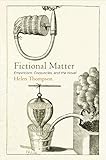Fictional Matter : Empiricism, Corpuscles, and the Novel / Helen Thompson.
Material type: TextPublisher: Philadelphia : University of Pennsylvania Press, [2016]Copyright date: ©2017Description: 1 online resource (368 p.) : 12 illusContent type:
TextPublisher: Philadelphia : University of Pennsylvania Press, [2016]Copyright date: ©2017Description: 1 online resource (368 p.) : 12 illusContent type: - 9780812248722
- 9780812293531
- Chemistry in literature
- Chemistry -- England -- History -- 18th century
- Empiricism in literature
- English fiction -- 18th century -- History and criticism
- Literature and science -- England -- History -- 18th century
- Science -- England -- History -- 18th century
- Cultural Studies
- Literature
- LITERARY CRITICISM / European / English, Irish, Scottish, Welsh
- 809/.93356 23
- PR851 .T47 2017eb
- online - DeGruyter
- Issued also in print.
| Item type | Current library | Call number | URL | Status | Notes | Barcode | |
|---|---|---|---|---|---|---|---|
 eBook
eBook
|
Biblioteca "Angelicum" Pont. Univ. S.Tommaso d'Aquino Nuvola online | online - DeGruyter (Browse shelf(Opens below)) | Online access | Not for loan (Accesso limitato) | Accesso per gli utenti autorizzati / Access for authorized users | (dgr)9780812293531 |
Frontmatter -- Contents -- Introduction -- Chapter 1. Boyle's Doctrine of Qualities -- Chapter 2. John Locke and Matter's Power -- Chapter 3. Morbific Matter and Character's Form -- Chapter 4. Race and the Corpuscle -- Chapter 5. Quality's Qualities: Fielding's Alchemical Imaginary -- Chapter 6. Fixing Sex: Richardson's Clarissa -- Epilogue. Denominating Oxygen -- Notes -- Bibliography -- Index -- Acknowledgments
restricted access online access with authorization star
http://purl.org/coar/access_right/c_16ec
In a groundbreaking study of the relationship between chemistry and literary history, Helen Thompson explores the ways in which chemical conceptions of matter shaped eighteenth-century British culture. Although the scientific revolution championed experimental, sense-based knowledge, chemists claimed that perceptible bodies were made of invisible particles or "corpuscles." Neither modern elements nor classical atoms, corpuscles were reactive, divisible units of matter. Imperceptible but real, the corpuscle transformed empirical knowledge in early modern science and the novel.Thompson offers new analyses of the chemistry, alchemy, color theory, physiology, environmental science, and medicine pioneered by Robert Boyle, Isaac Newton, Stephen Hales, John Mitchell, John Arbuthnot, and Thomas Sydenham to argue that they shaped cultural conceptions of racial, class, sex, and species identity. Juxtaposing science with readings of novels by Daniel Defoe, Eliza Haywood, Jonathan Swift, Samuel Richardson, Henry Fielding, William Rufus Chetwood, and Penelope Aubin, she shows how, at the level of form as well as character, novels represent perceptual knowledge that refers not to innate essence but to dynamic and unstable relations.The realist narrative mode that experimental science bequeaths to literary history, Fictional Matter argues, does not transparently mirror perceptible objects. Instead, novels represent the forms and relations through which imperceptible particles stimulate sensory experience. In this lucid, revisionary analysis of corpuscular chemistry, Thompson advances a new account of the influence of experimental science and empirical knowledge on the emergent realist novel.
Issued also in print.
Mode of access: Internet via World Wide Web.
In English.
Description based on online resource; title from PDF title page (publisher's Web site, viewed 26. Aug 2020)


